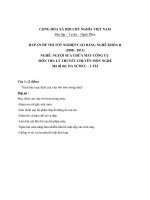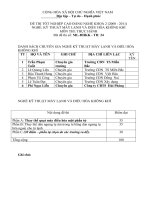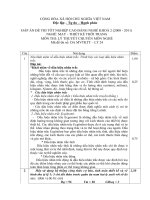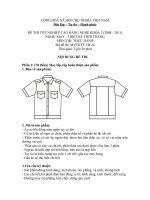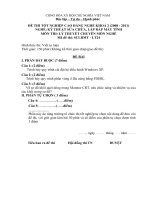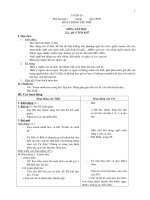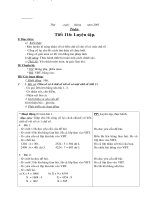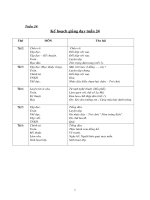PASSAGE 24
Bạn đang xem bản rút gọn của tài liệu. Xem và tải ngay bản đầy đủ của tài liệu tại đây (48.06 KB, 3 trang )
PASSAGE 24
The goal of Internet-based encyclopedia Wikipedia (www.wikipedia.org) is to give everyone on the planet
access to information. Like other encyclopedias, Wikipedia contains lots of information: more than 2.5
million articles in 200 different languages covering just about every subject. Unlike other encyclopedias,
however, Wikipedia is not written by experts, but by ordinary people. These writers are not paid and their
names are not published. They contribute to Wikipedia simply because they want to share their
knowledge.
Encyclopedias began in ancient times as collections of writings about all aspects of human knowledge.
The word itself comes from ancient Greek, and means “a complete general education”. Real popularity
for encyclopedias came in the nineteenth century in Europe and the United States, with the publication of
encyclopedias written for ordinary readers. With the invention of the CD-ROM, the same amount of
information could be put on a few computer discs. Then with the Internet, it became possible to create an
online encyclopedia that could be constantly updated, like Microsoft’s Encarta. However, even Internetbased encyclopedias like Encarta were written by paid experts. At first, Wikipedia, the brainchild of
Jimmy Wales, a businessman in Chicago, was not so different from these. In 2001, he had the idea for an
Internet-based encyclopedia that would provide information quickly and easily to everyone. Furthermore,
that information would be available free, unlike other Internet encyclopedias at that time.
But Wales, like everyone else, believed that people with special knowledge were needed to write the
articles, and so he began by hiring experts. He soon changed his approach, however, as it took them a
long time to finish their work. He decided to open up the encyclopedia in a radical new way, so that
everyone would have access not only to the information, but also to the process of putting this
information online. To do this, he used what is known as “Wiki” software (from the Hawaiian word for
“fast”), which allows users to create or alter content on web page. The system is very simple: When you
open the web site, you can simply search for information or you can log on to become a writer or editor of
articles. If you find an article that interests you – about your hometown, for example – you can correct it
or expand it. This process goes on until no one is interested in making any more changes.
Question 1. Microsoft’s Encarta is cited in the passage as an example of ________________
A. CD-ROM dictionary
B. printed encyclopedia
C. online encyclopedia
D. updateable online encyclopedia
Question 2. The word “brainchild” in the second paragraph of the passage can be best replaced by
________________
A. born
B. child
C. product
D. father
Question 3. The word “approach” in the third paragraph of the passage means ________________
A. idea
B. time
C. method
D. writing
Question 4. The user of Wikipedia can do all of the following EXCEPT ___________________
A. have access to information
B. determinate the website
C. modify information
D. edit information
Question 5. We can say that Jimmy Wales ________________
A. became very famous after the formation of Wikipedia
B. is the father of Wikipedia
C. made a great profit from Wikipedia
Page 1
D. decides who can use Wikipedia
Question 6. Wiki software enables ___________________
A. exchanging articles
B. a purchase of information
C. limited access
D. editing
Question 7. Wikipedia is a(n) _____________
A. book
B. journal
C. article
D. dictionary
C. normal people
D. world experts
Question 8. Wikipedia is written by _____________
A. paid written
B. millionaires
Question 9. The phrase “these writers” in the first paragraph refers to ________________
A. ordinary readers
B. ordinary people
C. encyclopedia experts
D. every subject
Question 10. The phrase “the word” in the second paragraph refers to _______________
A. knowledge
B. encyclopedia
C. writing
D. collection
ĐÁP ÁN
1-C
2-C
3-A
4-B
5-B
6-D
7-B
8-C
9-B
10-B
LỜI GIẢI CHI TIẾT
Question 1:
online encyclopedia
Thông tin ở đoạn sau: “Then with the Internet, it became possible to create an online encyclopedia that
could be constantly updated, like Microsoft’s Encarta”
(sau đó cùng với Internat, việc tạo một quyển bách khoa toàn thư trực tuyến có thể cập nhập thường
xuyên như Microsoft’s Encarta đã trở nên khả thi.)
Question 2:
product = sản phẩm
Question 3:
idea = ý tưởng
Question 4:
determinate the website
Thơng tin được tìm thấy trong đoạn sau: “When you open the web site, you can simply search for
information or you can log on to become a writer or editor of articles.
( khi bạn mở web site này, bạn có thể đơn giản là tìm thong tin, hoặc bạn có thể đăng nhập để trở thành
một người viết hoặc người chỉnh sửa của các bài báo.)
Question 5:
is the father of Wikipedia
Thơng tin được tìm thấy trong đoạn sau: “At first, Wikipedia, the brainchild of Jimmy Wales, a
businessman in Chicago, was not so different from these.”
(Ban đầu, Wikipedia, ý tưởng của Jimmy Wales, một thương nhận tại Chicago, không quá khác so với
những quyển điển bách khoa trực tuyến khác.)
Page 2
Question 6:
editing
Thơng tin được tìm thấy trong đoạn sau: If you find an article that interests you – about your hometown,
for example – you can correct it or expand it”
(Nếu bạn tìm một bài báo hấp dẫn bạn, về quê nhà của bạn chẳng hạn, bạn có thể sửa nó cho đúng hoặc
mở rộng nó.)
Question 7:
journal= tập san
Question 8:
normal people = những người bình thường.
Thơng tin trong đoạn sau: “Wikepedia is not written by experts, but by ordinary people”( Wikepedia
không được viết bởi các chuyên gia mà được viết bởi những người bình thường.)
Question 9:
ordinary people = những người bình thường.
Thơng tin được tìm thấy trong đoạn sau: “Wikepedia is not written by experts, but by ordinary people.
These writers are not paid and their names are not published. They contribute to Wikipedia simply
because they want to share their knowledge”
(Wikepedia không được viết bởi các chuyên gia mà được viết bởi những người bình thường. Những
người viết này khơng được trả lương và tên của họ không được công bố. Họ đóng góp cho Wikipedia đơn
giản vì họ muốn chia sẻ kiến thức của mình.)
Question 10:
encyclopedia
Thơng tin ở đoạn sau: “Encyclopedias began in ancient times as collections of writings about all aspects
of human knowledge. The word itself comes from ancient Greek, and means “a complete general
education”:
(Bách khoa toàn thư bắt đầu từ thời cổ đại như những bộ sưu tầm các bài viết về tất cả các lĩnh vực thuộc
về sự hiểu biết của loài người.)
Page 3
